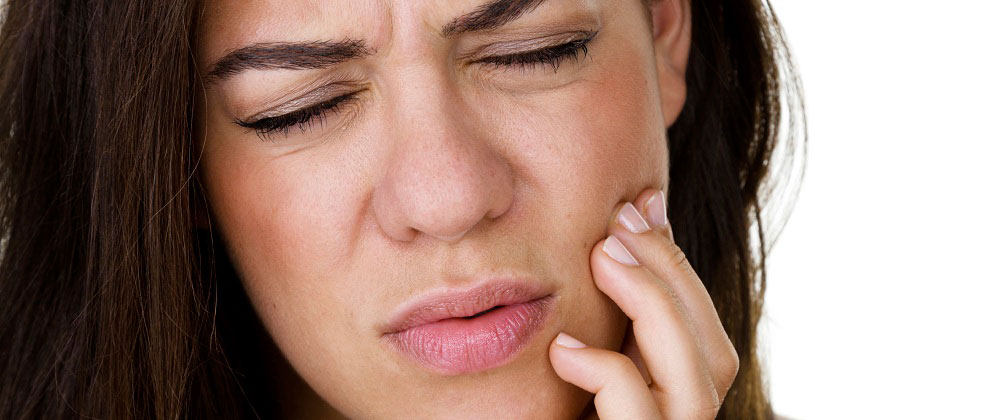Treatment for TMJD or Jaw Joint Pain
TMJD stands for Temporomandibular joint dysfunction or Temporomandibular joint disorder.
You might experience sudden pain in your jaw joint (TMJ) causing your jaw lock up, or hurt when chewing, or pop when you open/close your mouth. This is usually short-lived and reversible with proper management. Sometimes this means you are predisposed to more problems down the line, and this is a function of the underlying cause; this is more rare and you should proceed with simple remedies first.
The TMJ can be strained by yawning or opening wide for a long time such as at your dentist or hygienist. TMJ symptoms can also begin after a general anesthetic procedure, or after a blow to the jaw, or while chewing particularly vigorously on a hard/chewy foods. Pain can also arise spontaneously for no apparent reason, and this can be particularly disconcerting. You might have slept wrong on your jaw, or have or loose joint to begin with, or perhaps have a dental malocclusion or bite which can contribute to your otherwise unexplainable painful episode.
Treatment for Acute TMJ Pain
If pain last for more than a few days or is severe, call your dentist for an evaluation. Initial treatment depends on the cause of your particular symptoms, but usually involve the following:
Rest your jaw for several days/weeks. Eat very soft food such as yogurt, soups, scrambled eggs, smoothies/shakes, applesauce, soft rice, pudding, etc. Avoid chewing gum and hard, crunchy, chewy foods. Treat your jaw as your might an ankle or knee sprain where you would rest it. Avoid overusing your jaw with animated talking, excessive chewing, opening wide, yawning, as these activities can produce muscle spasms when your jaw is strained and prolong your healing.
Don’t intentionally pop your jaw joint, some patients do this in an attempt to reorient it, but this usually just adds to the problem. However, if your jaw is locked open and you can’t close it, do a soft side-to-side wiggle on your chin, and try to close gently. If your jaw locks and you can’t close it with reasonable manipulation you may need to to the hospital or seek the assistance of your dentist.
For acute injuries apply a cold pack several times a day for 10-15 minutes. Heat packs are helpful later on for muscle strain, chronic pain and stress. Take anti-inflammatory medications such as Ibuprofen (Advil or Motrin) or Naproxen (Aleve). These help reduce the muscle/joint inflammation, and helpful beyond reducing the pain. A typical dose of ibuprofen is 400-600 mg three times a day for several days. Use of an OTC muscle relaxant such as methocarbamol (Robaxin) can be helpful with muscle spasms.
Try to be aware of and avoid clenching your teeth, either from tension stress or while straining at a physical task. Try avoiding external pressure on your jaw, don’t cradle a telephone in your neck or rest your jaw on your chin. Try to sleep on your back and avoid sleeping on your stomach or side. Avoid caffeine and tobacco these stimulants will produce muscle tension including in your jaw muscles.
Do facial massages with your hands several times a day, let your jaw go slack and massage your jaws gently. Be aware of your body tension, such as back, neck, and especially shoulder tension. Usually TMJ dysfunction symptoms are found in conjunction with other physical symptoms of stress such as headaches, upper back, shoulder and neck tension.
Manage your stressors, even emotional tension can cause us to clench or grind. To care for yourself in this regard this may include any of the following, if applicable: exercise, sufficient sleep/rest, good nutrition, yoga, meditation, massage therapy, physiotherapy, working out stress/conflicts at home/work, or psychotherapy.
See your dentist if your discomfort lasts/lingers. Sometimes a splint or night guard needs to be constructed to help your jaw recover. Some patients can buy sports bite-guards and adapt them in hot water, but usually you will need a better fitting guard to use at night or for long term. For these you will need to see your dentist. Usually, sudden-onset jaw pain is muscular in origin, and a splint can help reverse this situation. Often this splint will initially need to be used all day for a days to weeks. The rationale for splints is to break up night grinding, and spasms in your chewing muscles. For some patients who continue to clench/grind at night continued wear of the night guard is recommended.
Chronic TMJ Pain
In some cases patients have chronic pain from TMJ dysfunction. In severe cases that cannot be managed with self care they are referred to an oral medicine specialist and/or an oral surgeon for treatment. With milder cases self care is similar to acute cases with the addition of supportive measures before/during/after dental procedures:
Moist heat the day before, the day of, and the day after a dental visit: minimum twice a day for 10 minutes.
Anti-inflammatory and/or muscle relaxant the day of and the day after the appointment. You may need an escort to take you to and from the appointment depending on the type of muscle relaxant and dose.
Short appointments, use of a mouth prop, frequent rest periods, and moist heat during the procedure.
Ice pack to the joint for 24 hours after appointments.
Physiotherapy after appointment (if previously found beneficial).
For more on TMJD or to seek treatment for jaw joint pain in Vancouver, come see either Dr. Robin Mak or Dr. Sakura. We are dentists who treat TMJD in Vancouver.






